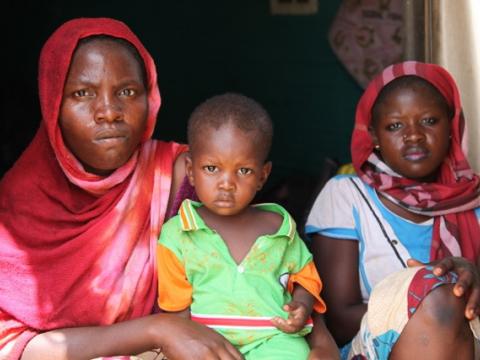Mariama’s family is safe now!

Mariama fled the city of Damasak in Nigeria, November 2014 to the village of Gagamari, in Niger. Nigerians massively fled across the border with Niger when insurgents of B H attacked their town, Damasak, on 24 November 2014. The makeshift camp of Gagamari in Diffa region counts 16,000 refugees. According to Mariama the journey from Nigeria to Niger was a matter of life and death for family. “The future for our family was uncertain, we had to leave and leave fast especially after they had taken two of our children Joseph, 11, and Emmanuel, 7,” Says Mariama , rubbing her eyes to clean the tears
“My husband James, I and our four children, Philip, 20; Martha, 17; Esther, 9; and Titus, 2 years old, had to swim 40 to 20 meters in the Komadougou Yobe river (the Yobe River, is a river in West Africa that flows into Lake Chad through Nigeria and Niger) and walk 73 km to reach Gagamari refugee camp in Diffa region (Niger). I can tell you that it wasn’t an easy journey, but we made it because God was with us,” Says Mariama.
Mariama and her family are among the few survivors of the attacks of Damasak. She use to make and sell doughnuts, and her husband sells meat in the market town of Damasak. It is located near the confluence of the Yobe River and Komadugu Gana River, adjoining the border with Niger.
The town was liberated in March from B H militants by Nigerien and Chadian soldiers. The atrocities of B H’s reign were brought to light when at least 70 bodies were discovered, many with their throats slit, scattered under a bridge.
Mariama is still living with the memories of the terrifying events her family endured in Damasak. ”I still can’t sleep, I spend most nights awaken and when I fall asleep I have nightmares and sometimes wake up jumping in bed, because of the atrocities from Damasak still haunt me,” says Mariama with an worrying look.
“My daughter, Esther, have nightmares most nights. She dreams that people is cutting her arms and recently she complains of having problems with her eyesight. The doctor said that Esther problem is to do with the traumatic events the she witness in Damasak,” Says Mariama looking desperately to her daughter
“Our older son Philip sometimes helps the government food distribution people in the camp, and the money he receives we are able to buy other food items. I pray that one day all our suffering will come to an end and hope that we could return back to our home town,” says Mariama, raising her hands in the air.
“Last week I hear people in the camp saying that B H has been thrown out of Damasak. This news really made me feel happy because I want to recover my former life, and there is a chance that B H may free Joseph and Emmanuel,” adds Mariama with a doubtful and faithful look in her face.
Mariam’s family is one of 750 households helped by World Vision and Samaritan's Purse last January, through the distribution ofnon-food items (bucket, blanket and soap) .
"Since we arrived, we never lack shelter or food, we really thank you for your support,” Mariama says. “When my family and I reached this place, we were welcomed by the local community, then some people from local government and people from other NGO’s. We receive lots of useful items from one NGO. Most of the materials were stamped with a logo carrying a cross. When these people came to visit us, I could easily recognize the logo and the cross on their T-shirt and vehicles. Because it looks like the cross from Bethlehem. So I said to my friend, the Christians come to save us. The materials they give us (bucket, blanket, soap and plastic cups) helped us, to maintain our hygiene, wash our clothing and cook our food because we came to Niger empty handed.
“But I really miss my children Joseph, and Emmanual, that B H took from me,” says Mariama in tears. “The problem is that I don’t know if they still alive.”Since February 6, 2015 a substantial influx of newly displaced people from Nigeria into Diffa has both altered an increased the profile of humanitarian need. For that reason World Vision is conducting a second phase response (of days 90-180), which will focus on water and sanitation (including potable water & hygiene items) and child protection.